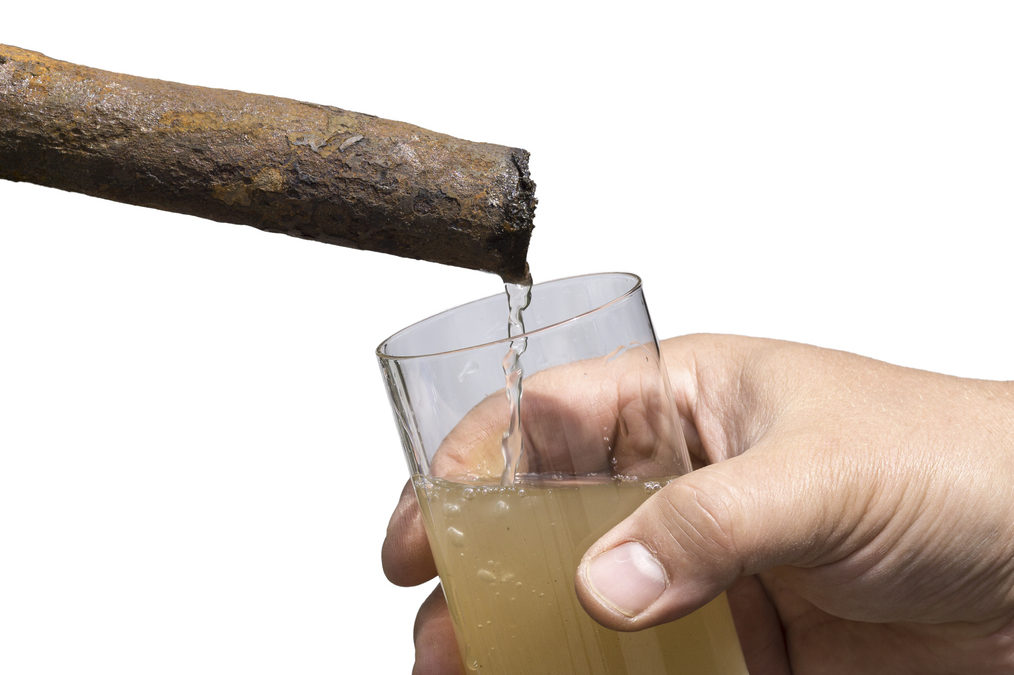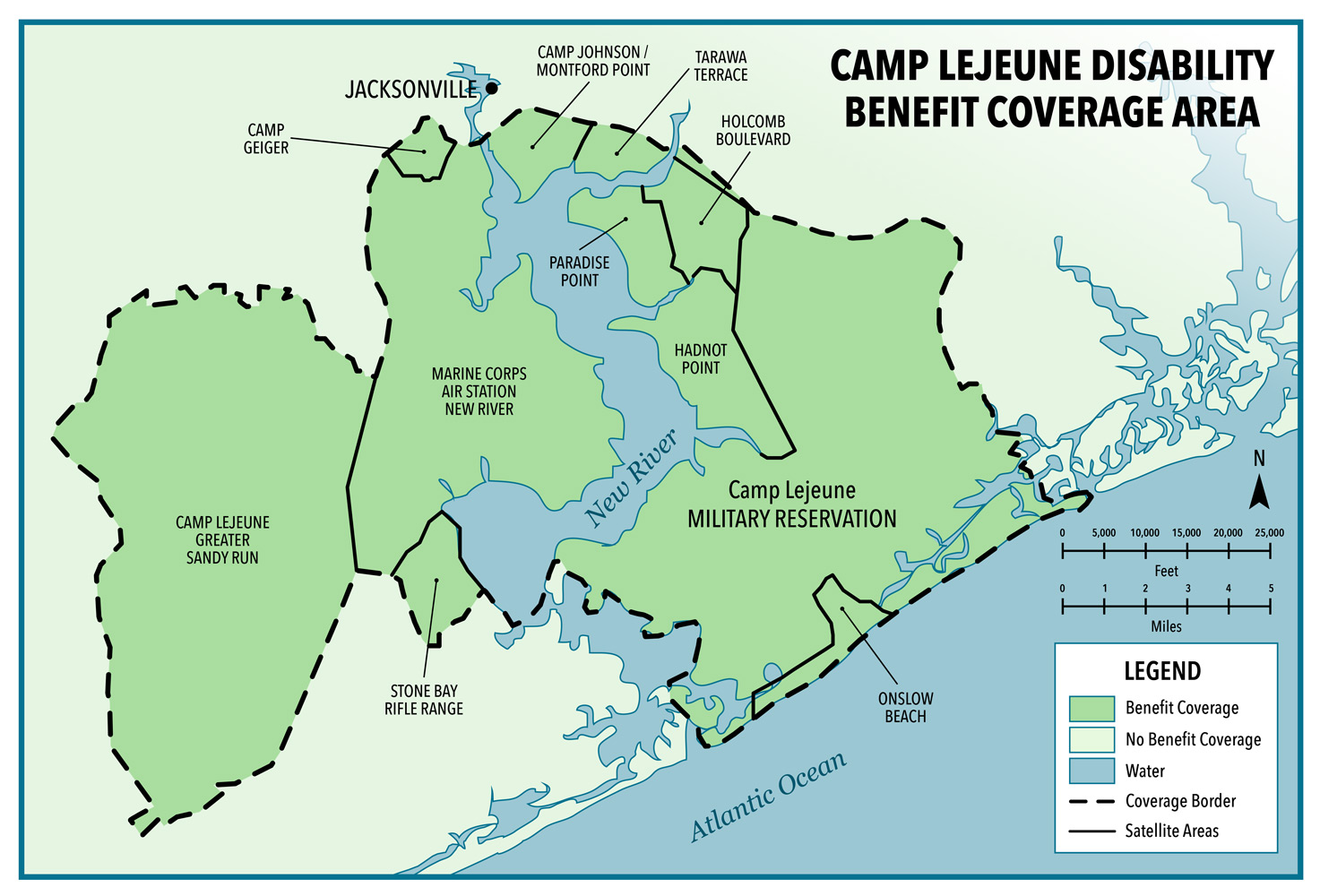The Camp Lejeune Justice Act will allow military veterans and family members to file lawsuits for cancer and health problems linked to toxic water contamination from 1953 through 1987.
What You Can Do & How We Can Help
The Schmidt Firm, PLLC is currently accepting Camp Lejeune water contamination induced injury cases in all 50 states. If you or somebody you know has been diagnosed with cancer or other serious health problems from toxic chemicals in drinking water at Camp Lejeune, you should contact our lawyers immediately for a free case consultation. Please use the form below to contact our Toxic Chemical Litigation Group or call toll free 24 hours a day at (866) 920-0753.
UPDATE: More Than 100 Lawsuits Filed Over Camp Lejeune Water
As of February 2023, more than 100 lawsuits have been filed over Camp Lejeune water contamination by U.S. veterans and their family members. So far, about 20,000 administrative claims have also been filed, and many of these claims will become lawsuits after a 6-month waiting period is over. All of the lawsuits allege that toxic chemicals in the water caused cancer, Parkinson’s Disease, kidney damage and other health problems.
U.S. Senate Passes Camp Lejeune Justice Act
In June 2022, the U.S. Senate passed the Camp Lejeune Justice Act (H.R. 2192), which will enable military veterans, their family members, and civilians to file lawsuits against the U.S. government for exposure to toxic chemicals in the drinking water between 1952 and 1987.
Do I Qualify for a Camp Lejeune Water Lawsuit?
You may be eligible to file a Camp Lejeune water contamination lawsuit if you are:
- Veteran, Reservist, Guardsman (“VRG”) or their legal representative
- The spouse of a VRG
- The ex-spouse of a VRG (certain conditions apply)
- The biological child of a VRG (alive at the time)
- The biological child of a VRG (in utero at the time)
- The stepchild of a VRG
- The legal dependent of a VRG (living with him/her at the time)
- Civilian contractor (who worked on base at the time)
You must have lived or worked on base at Camp Lejeune for a minimum of 30 consecutive days during the period beginning August 1, 1953, and ending December 31, 1987.
You must have been exposed to the water at Camp Lejeune that was supplied by the United States or on its behalf.
You must have been diagnosed with one of the following diseases* after having lived or worked at Camp Lejeune for a minimum of 30 consecutive days during the above-mentioned dates:
- Adult Leukemia*
- Aplastic Anemia*
- Bladder Cancer*
- Breast Cancer
- Esophageal Cancer
- Female Infertility
- Hepatic Steatosis
- Kidney Cancer*
- Liver Cancer*
- Lung Cancer
- Miscarriage
- Multiple Myeloma*
- Myelodysplastic Syndrome*
- Neurobehavioral Effects
- Non-Hodgkin’s Lymphoma*
- Parkinson’s Disease*
- Renal Toxicity
- Scleroderma
- The ( * ) means that strong scientific evidence exists for these conditions. No direct evidence exists yet on the others, but they are currently qualified by the VA for medical benefits (but not disability).
Camp Lejeune Justice Act of 2022
Hundreds of lawsuits have already been filed by people who developed health problems after drinking the water at Camp Lejeune.
Years ago, around 850 of these lawsuits were consolidated into a Multi-District Litigation (MDL) — but despite public outrage, all of the lawsuits were dismissed in 2016 due to a law in North Carolina called a “statute of repose,” which required all tort lawsuits to be filed within 10 years.
Essentially, it was too late for victims to file lawsuits because it had been more than 10 years since Camp Lejeune shut down the contaminated wells in 1987.
In response, lawmakers proposed a new federal law, called the Camp Lejeune Justice Act of 2022 to circumvent the law in North Carolina and give victims the opportunity to file lawsuits in federal court. Claimants would have 2 years to file lawsuits.
The law will cover all active-duty military personnel, National Guard and reserve members, along with their family members, who were exposed to contaminated water for at least 30 days at Camp Lejeune.
What is the problem?
An estimated 900,000 veterans, family members, and civilians were potentially exposed to toxic chemicals in drinking water at Camp Lejeune between 1953 and 1987, according to health officials.
Where Did The Chemicals Come From?
The toxic water contamination came from a variety of sources, including industrial spills, solvents used in degreasing weapons, underground storage tanks, and an off-base dry cleaning company.
What Chemicals Were in the Drinking Water At Camp Lejeune?
- Trichloroethylene (TCE)
- Perchloroethylene (PCE)
- Benzene
- Vinyl chloride
- Industrial solvents
- Trans 1,2‐dichloroethylene, (1,2‐tDCE)
- And more
What is the Risk?
Exposure to these toxic chemicals is linked to many severe, life-threatening health problems, but especially cancer. Other non‐cancer diseases linked to these chemicals include birth defects, aplastic anemia, infertility, kidney diseases, liver disease, lupus, miscarriage, Parkinson’s disease, scleroderma, skin disorders, and more.
What is Camp Lejeune?
Marine Corps Base Camp Lejeune is a 246-square-mile military base and training facility North Carolina that has been in use since 1942.
What Happened?
In the 1980s, the Marine Corps tested the two primary water treatment facilities that had supplied water to Camp Lejeune since the 1950s: Tarawa Terrace and Hadnot Point. They were alarmed to discover that Camp Lejeune’s water supply was contaminated with extremely high levels of toxic chemicals linked to cancer and other health hazards.
PCE in Tarawa Terrace Water Treatment Plant
Perchloroethylene (PCE) was the primary contaminant found in wells serving the Tarawa Terrace system. PCE is 60% heavier than water, and if spilled, it sinks into the groundwater and migrates into nearby drinking water wells. This is exactly what happened at Camp Lejeune.
PCE was used by an off-base dry cleaner (ABC One-Hour Cleaners), which began operating in 1953. The dry cleaning company massively contaminated the groundwater by spilling and dumping PCE for decades. And it doesn’t take much — just a shot glass of PCE can contaminate an Olympic-sized swimming pool full of water.
For drinking water, the EPA has a maximum safe limit for PCE at 5 parts per billion (ppb). Investigators found that the water supplied to Camp Lejeune by the Tarawa water treatment plant contained PCE levels up to 215 ppb, which is 43 times the EPA’s maximum safe limit.
Investigators also found other, smaller on-base sources of PCE contamination, because it was also used by the military as a multi-purpose solvent. As a result of the widespread contamination, the entire Tarawa Terrace water-treatment plant was shut down in 1987.
PCE and TCE in Hadnot Point Water Supply
The contamination of the Hadnot Point water supply involved multiple sources, with multiple toxic chemicals — but the primary contaminant in the wells was Trichloroethylene (TCE), an odorless and colorless liquid chemical that causes cancer. The Hadnot Point system was also contaminated with PCE and benzene.
TCE may have leaked out of underground storage tanks, or from leaky drums at dumps and storage lots, and spilled from on-base industrial sites. For decades, TCE was commonly used as a solvent and degreaser for weapons. TCE was also used to make refrigerants.
For TCE in drinking water, the EPA’s maximum safe limit is 5 μg/L. The TCE contamination at Hadnot Point plant occurred from August 1953 through January 1985, with the maximum level of 783 μg/L reached during November 1983, according to the CDC investigation.
Hadnot Plant was also found to contain PCE between August 1974 and January 1985. Reconstructed PCE concentrations in Hadnot Point drinking water reached a maximum level of 39μg/L in November 1983. The EPA’s maximum safe limit for PCE is 5 μg/L.
How Were People Exposed?
People at Camp Lejeune may have been exposed to the toxic contaminated water at home, at work, and in other settings — such as by drinking water, skin contact, and breathing volatile compounds in the air during showering, bathing, dishwashing, and other activities.
Health Problems Linked to Camp Lejeune Water
- Adult leukemia
- Aplastic anemia and other myelodysplastic syndromes
- Birth defects (spina bifida, etc.)
- Bladder cancer
- Breast cancer
- Esophageal cancer
- Female infertility or miscarriages
- Hepatic steatosis
- Kidney cancer
- Leukemia
- Liver cancer
- Lung cancer
- Male breast cancer
- Miscarriage
- Multiple myeloma
- Myelodysplastic syndromes
- Neurobehavioral effects
- Non-Hodgkin’s lymphoma
- Parkinson’s disease
- Renal toxicity
- Scleroderma
- And more
Do I have a Camp Lejeune Water Lawsuit?
The Schmidt Firm, PLLC is currently accepting Camp Lejeune water contamination induced injury cases in all 50 states. If you or somebody you know has been diagnosed with cancer or other serious health problems from toxic chemicals in drinking water at Camp Lejeune, you should contact our lawyers immediately for a free case consultation. Please use the form below to contact our Toxic Chemical Litigation Group or call toll free 24 hours a day at (866) 920-0753.
Attention Lawyers: We consider a referral from another law firm to be one of the greatest compliments. If your firm is interested in referring us a case or for us to send you a list of previous award judgments and/or average referral fees, please visit the Lawyer Referral section of our website.



 The Schmidt Firm, PLLC has been recognized as one of the nation’s leading plaintiffs' law firms and handles cases in all 50 states. We are very proud of our legal achievements, but equally self-respecting of our firm's reputation for providing personal attention to each and every client we represent.
The Schmidt Firm, PLLC has been recognized as one of the nation’s leading plaintiffs' law firms and handles cases in all 50 states. We are very proud of our legal achievements, but equally self-respecting of our firm's reputation for providing personal attention to each and every client we represent.

